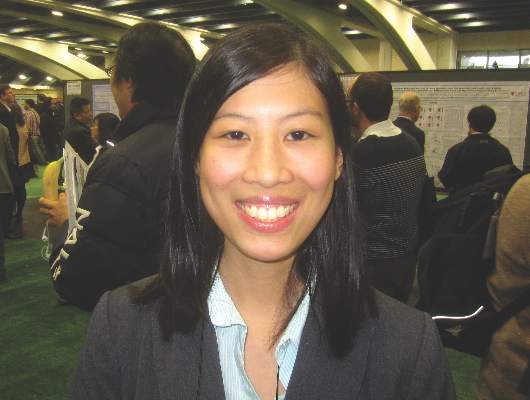User login
SAN FRANCISCO – Mycophenolate significantly reduces the need for endoscopic interventions for gastric antral vascular ectasia in patients with systemic sclerosis, according to investigators from the Cleveland Clinic.
In a retrospective chart review of 48 systemic sclerosis patients with gastric antral vascular ectasia (GAVE), the 19 patients not on immunosuppressive agents needed 1.37 endoscopies per year. The 14 patients on mycophenolate needed 0.25 per year. Mycophenolate patients were far less likely to need endoscopy (relative risk, 0.19; 95% confidence interval, 0.05-0.70; P = .013).
Other immunosuppressives such as glucocorticoids, hydroxychloroquine, cyclophosphamide, and methotrexate also reduced the frequency of endoscopies, but not as much. The investigators found that patients on any immunosuppressive agent needed 0.51 endoscopies per year.
“Mycophenolate should be considered a potential treatment to alter the course of disease particularly in patients that need frequent therapeutic endoscopies. We are considering it more and more in our GAVE patients,” said investigator Dr. Tiffany Lin, a rheumatology fellow at the Cleveland Clinic Foundation.
“We had a suspicion that” immunosuppression might help “based on prior reports that looked at cyclophosphamide. We sought to” find other “immunosuppressive therapies that were less toxic and were surprised and excited about the results with mycophenolate,” she said at the annual meeting of the American College of Rheumatology.
The mean dose of mycophenolate in the study was 1 g twice a day. The duration of treatment varied from months to years.
In GAVE, also known as “watermelon stomach,” antral blood vessels are dilated and likely to bleed. It is an increasingly recognized cause of upper gastrointestinal bleeding in patients with systemic sclerosis.
There’s currently no defined role for immunosuppressive therapy in GAVE, which is usually treated with endoscopic argon plasma coagulation of the aberrant vessels.
Patients in the study were in their mid-60s on average, and the majority were women. There were no significant differences in hospitalization or blood transfusion frequencies between immunosuppressed and nonimmunosuppressed patients.
The investigators have no disclosures, and there was no outside funding for the project.
SAN FRANCISCO – Mycophenolate significantly reduces the need for endoscopic interventions for gastric antral vascular ectasia in patients with systemic sclerosis, according to investigators from the Cleveland Clinic.
In a retrospective chart review of 48 systemic sclerosis patients with gastric antral vascular ectasia (GAVE), the 19 patients not on immunosuppressive agents needed 1.37 endoscopies per year. The 14 patients on mycophenolate needed 0.25 per year. Mycophenolate patients were far less likely to need endoscopy (relative risk, 0.19; 95% confidence interval, 0.05-0.70; P = .013).
Other immunosuppressives such as glucocorticoids, hydroxychloroquine, cyclophosphamide, and methotrexate also reduced the frequency of endoscopies, but not as much. The investigators found that patients on any immunosuppressive agent needed 0.51 endoscopies per year.
“Mycophenolate should be considered a potential treatment to alter the course of disease particularly in patients that need frequent therapeutic endoscopies. We are considering it more and more in our GAVE patients,” said investigator Dr. Tiffany Lin, a rheumatology fellow at the Cleveland Clinic Foundation.
“We had a suspicion that” immunosuppression might help “based on prior reports that looked at cyclophosphamide. We sought to” find other “immunosuppressive therapies that were less toxic and were surprised and excited about the results with mycophenolate,” she said at the annual meeting of the American College of Rheumatology.
The mean dose of mycophenolate in the study was 1 g twice a day. The duration of treatment varied from months to years.
In GAVE, also known as “watermelon stomach,” antral blood vessels are dilated and likely to bleed. It is an increasingly recognized cause of upper gastrointestinal bleeding in patients with systemic sclerosis.
There’s currently no defined role for immunosuppressive therapy in GAVE, which is usually treated with endoscopic argon plasma coagulation of the aberrant vessels.
Patients in the study were in their mid-60s on average, and the majority were women. There were no significant differences in hospitalization or blood transfusion frequencies between immunosuppressed and nonimmunosuppressed patients.
The investigators have no disclosures, and there was no outside funding for the project.
SAN FRANCISCO – Mycophenolate significantly reduces the need for endoscopic interventions for gastric antral vascular ectasia in patients with systemic sclerosis, according to investigators from the Cleveland Clinic.
In a retrospective chart review of 48 systemic sclerosis patients with gastric antral vascular ectasia (GAVE), the 19 patients not on immunosuppressive agents needed 1.37 endoscopies per year. The 14 patients on mycophenolate needed 0.25 per year. Mycophenolate patients were far less likely to need endoscopy (relative risk, 0.19; 95% confidence interval, 0.05-0.70; P = .013).
Other immunosuppressives such as glucocorticoids, hydroxychloroquine, cyclophosphamide, and methotrexate also reduced the frequency of endoscopies, but not as much. The investigators found that patients on any immunosuppressive agent needed 0.51 endoscopies per year.
“Mycophenolate should be considered a potential treatment to alter the course of disease particularly in patients that need frequent therapeutic endoscopies. We are considering it more and more in our GAVE patients,” said investigator Dr. Tiffany Lin, a rheumatology fellow at the Cleveland Clinic Foundation.
“We had a suspicion that” immunosuppression might help “based on prior reports that looked at cyclophosphamide. We sought to” find other “immunosuppressive therapies that were less toxic and were surprised and excited about the results with mycophenolate,” she said at the annual meeting of the American College of Rheumatology.
The mean dose of mycophenolate in the study was 1 g twice a day. The duration of treatment varied from months to years.
In GAVE, also known as “watermelon stomach,” antral blood vessels are dilated and likely to bleed. It is an increasingly recognized cause of upper gastrointestinal bleeding in patients with systemic sclerosis.
There’s currently no defined role for immunosuppressive therapy in GAVE, which is usually treated with endoscopic argon plasma coagulation of the aberrant vessels.
Patients in the study were in their mid-60s on average, and the majority were women. There were no significant differences in hospitalization or blood transfusion frequencies between immunosuppressed and nonimmunosuppressed patients.
The investigators have no disclosures, and there was no outside funding for the project.
AT THE ACR ANNUAL MEETING
Key clinical point: Mycophenolate reduces the frequency of recurrent gastric antral vascular ectasia in systemic sclerosis.
Major finding: Nineteen patients not on immunosuppressive agents needed 1.37 endoscopies per year. The 14 patients on mycophenolate needed 0.25 per year.
Data source: The study was a retrospective review of 48 systemic sclerosis patients with GAVE.
Disclosures: The investigators have no disclosures, and there was no outside funding for the project.

